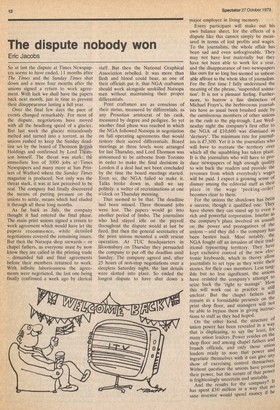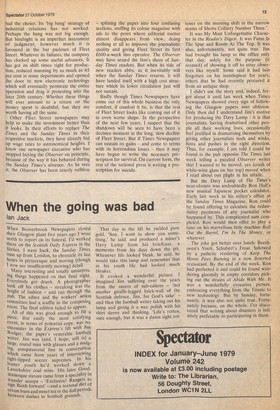The dispute nobody won
Eric Jacobs
So at last the dispute at Times Newspapers seems to have ended, 11 months after The Times and the Sunday Times shut down and a mere four months after the unions signed a return to work agreement. With luck we shall have the papers back next month, just in time to prevent their disappearance lasting a full year.
Over the final few days the pace of events changed remarkably. For most of the dispute, negotiations have moved with all the headlong speed of a glacier. But last week the glacier miraculously melted and turned into a torrent, as the unions rushed to keep the Sunday deadline set by the board of Thomson Ari,tish Holdings and confirmed by Lord '1118,nson himself. The threat was stark: Ili immediate loss of 3000 jobs at '.Times Newspapers and many more at Sun Printers of Watford where the Sunday Times magazine is produced. Not only was the threat stark, it was at last perceived to be real. The company had finally discovered the means of putting pressure on the unions to settle, means which had eluded it through all these long months.
As far back as July, the company thought it had entered the final phase. The main print unions signed a return to work agreement which would have let the papers recommence, while detailed negotiations covered the remaining issues. But then the Natsopa shop stewards — or chapel fathers, as everyone must by now know they are called in the printing trade — demanded full and final agreements before their members returned to work. With infinite laboriousness the agreements were negotiated, the last one being finally 'confirmed a week ago by clerical staff. But then the National Graphical Association rebelled. It was more than flesh and blood could bear, as one of their officials put it, that NGA craftsmen should work alongside unskilled Natsopa men without maintaining their proper differentials.
Print craftsmen are as conscious of their status, measured by differentials, as any Proustian aristocrat of his rank, measured by degree and pedigree. So yet another final phase was reached in which the NGA followed Natsopa in negotiation on full operating agreements that would restore their sacred differentials. Board meetings at three levels were arranged for last Thursday, and Lord Thomson was announced to be airborne from Toronto in order to make the final decisions in London if a deal had not been concluded by the time the board meetings started. Even so, the NGA failed to make it. Talks broke down in, shall we say politely, a welter of recriminations at one o'clock on Thursday morning.
That seemed to be that. The deadline had been missed. Three thousand jobs were lost. The papers would go into another period of limbo. The journalists who had stayed idle on the payroll throughout the dispute would at last be fired. But then the general secretaries of the print unions mounted a swift rescue operation. At TUC headquarters in Bloomsbury on Thursday they persuaded the company to put off the deadline until Sunday. The company agreed and, after 25 hours of non-stop negotiations over a sleepless Saturday night, the last details were slotted into place. So ended the longest dispute to have shut down a major employer in living memory.
Every participant will make out his own balance sheet, for the effects of a dispute like this cannot simply be measured in terms of lost profits and wages. To the journalists, the whole affair has been sad and even unforgiveable. They may not have lost materially but they have not been able to work for a year, and the disappearance of two newspapers like ours for so long has seemed an unbearable affront to the whole idea of journalism. For the first time I fully understand the meaning of the phrase, 'suspended animation'. It is not a pleasant feeling. Furthermore, to borrow a fine distinction of Michael Frayn's, the herbivorous journalists have as usual been brushed aside by the carnivorous members of other unions in the rush to the pig-trough. Last Wednesday night the company's first offer to the NGA of £10,600 was dismissed as 'derisory'. The minimum rate for journalists is £7,500. Yet it is the journalists who will have to recreate the territory over which all the squabbling has taken place. It is the journalists who will have to produce newspapers of high enough qualitY to win back the readers and provide the revenues from which everybody's wages will be paid. I expect a growing sense of dismay among the editorial staff as their place in the wage 'pecking-order' becomes clear to them.
For the unions the shutdown has been a success, though a qualified one. They have shown they can stand up to even a rich and powerful corporation. Insofar as the company's plans involved an assault on the power and prerogatives of the unions — and they did — the company has been beaten back. Most notably, the NGA fought off an invasion of their traditional typesetting territory. They have kept exclusive control of the new electronic keyboards, which in theory allow journalists to set type as they write their stories, for their own members. Less tangible but no less significant, the unions have resisted the company's attempt to seize back the 'right to manage'. How this will work out in practice is still unclear. But the chapel fathers will remain as a formidable presence on the print shop floor, and managers will not be able to bypass them in giving instructions to staff as they had hoped. On the other hand, the structure of union power has been revealed in a way that is displeasing, to say the least, for many union leaders. Power resides on thde shop floor and among chapel fathers an branch officials, and only those union_ leaders ready to woo that power and ingratiate themselves with it can give any show of exercising control themselves. Without question the unions have proved their power, but the nature of that power is frighteningly uncertain and unstable. _ And the results for the company'? It has spent £30 million in a way that no sane investor would spend money if he had the choice. Its 'big bang' strategy of industrial relations has not worked. Perhaps the bang was not big enough. But hindsight is an imperfect instrument of judgment, however much it is favoured in the bar parlours of Fleet Street. Whatever its failures, the company has clocked up some useful advances. It has got its shift times right for production, reduced manning by as much as 45 per cent in some departments and opened the door to new electronic technology which will eventually permeate the entire operation and drag it protesting into the later 20th century. Whether these things will ever amount to a return on the money spent is doubtful, but they are worth having all the same.
Other Fleet Street newspapers may help to make the investment better than it looks. In their efforts to replace The Times and the Sunday Times in their respective markets, they have already bid up wage rates to astronomical heights. I know one newspaper executive who has stopped buying the Observer on principle, because of the way it has behaved during the Sunday Times's absence. As he sees it, the Observer has been utterly ruthless — splitting the paper into four confusing sections, stuffing its colour magazine with ads to the point where editorial matter almost disappears from view, doing nothing at all to improve the journalistic quality and giving Fleet Street its first £600-a-week lino operator. The Observer may have seized the lion's share of Sunday Times readers. But when its tide of new readers ebbs, as it inevitably will when the Sunday Times returns, it will have landed itself with a high cost structure which its lower circulation just will not sustain.
Badly though Times Newspapers have come out of this whole business the only comfort, if comfort it be, is that the rest of Fleet Street looks like coming out of it in even worse shape. In the perspective of the next few years, I suspect that the shutdown will be seen to have been a decisive moment in the long, slow decline of Fleet Street. But if Times Newspapers can sustain its gains — and come to terms with its horrendous losses — then it may have begun to write the necessary prescription for survival. On current form, the rest of the national press is writing a prescription for suicide.



































 Previous page
Previous page